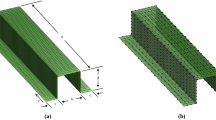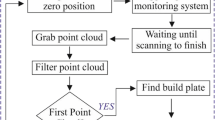Abstract
Recent advancements in measurement systems have brought new opportunities to enhance the performance of quality control (QC) systems in modern manufacturing. Digital cameras and optical scanners are among these advanced measurement systems that are used for automated surface inspection. They can represent an entire product’s surface with high-density (HD) data in the forms of digital images and point clouds, respectively. Although both measurement systems provide HD data, their datasets are fundamental different and contain different information regarding a part’s surface. Extensive research efforts have been conducted to develop QC tools for each of these datasets individually; however, little research has focused on taking advantage of both point clouds and digital images simultaneously. To fully take advantage of information from both datasets, and more importantly their spatial cross correlation, this paper aims to use fused image/point cloud datasets to advance the capability of QC systems. A key challenge in incorporating both datasets is that the costs of acquiring data from these measurement systems differ drastically, making online monitoring using fused datasets less appealing. To overcome this challenge, a novel off-line/on-line hybrid monitoring scheme is proposed. The effectiveness of this proposed hybrid monitoring scheme is demonstrated with an additive manufacturing case study.







Similar content being viewed by others
References
Armingol, J. M., Otamendi, J., De La Escalera, A., Pastor, J. M., & Rodriguez, F. J. (2003). Statistical pattern modeling in vision-based quality control systems. Journal of Intelligent and Robotic Systems, 37(3), 321–336.
Boudjemaa, R., & Forbes, A. B. (2004). Parameter estimation methods for data fusion: national physical laboratory. Centre for Mathematics and Scientific Computing.
Colosimo, B. M. (2018). Modeling and monitoring methods for spatial and image data. Quality Engineering, 30(1), 94–111.
Colosimo, B. M., & Grasso, M. (2018). Spatially weighted PCA for monitoring video image data with application to additive manufacturing. Journal of Quality Technology, 50(4), 391–417.
Colosimo, B. M., Mammarella, F., & Petro, S. (2010). Quality control of manufactured surfaces. In Frontiers in Statistical Quality Control (vol. 9, pp. 55–70). Physica-Verlag HD.
Colosimo, B. M., Pacella, M., & Senin, N. (2015). Multisensor data fusion via Gaussian process models for dimensional and geometric verification. Precision Engineering, 40, 199–213.
Dastoorian, R., Elhabashy, A. E., Tian, W., Wells, L. J., & Camelio, J. A. (2018, June). Automated surface inspection using 3D point cloud data in manufacturing: A case study. In International manufacturing science and engineering conference (Vol. 51371, p. V003T02A036). American Society of Mechanical Engineers.
Ding, Y., Zeng, L., & Zhou, S. (2006). Phase I analysis for monitoring nonlinear profiles in manufacturing processes. Journal of Quality Technology, 38(3), 199–216.
Facco, P., Bezzo, F., Romagnoli, J. A., & Barolo, M. (2008). Using digital images for fast, reliable, and automatic characterization of surface quality. In Workshop on nanomaterials production, characterization and industrial applications.
Fanaee-T, H., & Gama, J. (2016). Tensor-based anomaly detection: An interdisciplinary survey. Knowledge-Based Systems, 98, 130–147.
Fayazbakhsh, K., Movahedi, M., & Kalman, J. (2019). The impact of defects on tensile properties of 3D printed parts manufactured by fused filament fabrication. Materials Today Communications, 18, 140–148.
Graham, K. J., Krishnapisharody, K., & Irons, G. (2007). Monitoring ladle eye dynamics using multivariate statistical methods. In AIST proceedings: AISTech 2007.
Jahromi, H. S., & Setoodeh, A. (2020). Longitudinal, transverse, and torsional free vibrational and mechanical behavior of silicon nanotubes using an atomistic model. Materials Research, 23(2).
Jiang, B. C., Wang, C. C., & Liu, H. C. (2005). Liquid crystal display surface uniformity defect inspection using analysis of variance and exponentially weighted moving average techniques. International Journal of Production Research, 43(1), 67–80.
Jolliffe, I. T. (2002). Principal components in regression analysis. In Principal component analysis (pp. 167–198).
Khanzadeh, M., Rao, P., Jafari-Marandi, R., Smith, B. K., Tschopp, M. A., & Bian, L. (2018a). Quantifying geometric accuracy with unsupervised machine learning: Using self-organizing map on fused filament fabrication additive manufacturing parts. Journal of Manufacturing Science and Engineering, 140(3).
Khanzadeh, M., Tian, W., Yadollahi, A., Doude, H. R., Tschopp, M. A., & Bian, L. (2018b). Dual process monitoring of metal-based additive manufacturing using tensor decomposition of thermal image streams. Additive Manufacturing, 23, 443–456.
Li, X., Siahpour, S., Lee, J., Wang, Y., & Shi, J. (2020). Deep learning-based intelligent process monitoring of directed energy deposition in additive manufacturing with thermal images. Procedia Manufacturing, 48, 643–649.
Liang, Y. T., & Chiou, Y. C. (2008). Vision-based automatic tool wear monitoring system. In 2008 7th World Congress on intelligent control and automation (pp. 6031–6035). IEEE.
Liu, M., Cheung, C. F., Cheng, C. H., & Lee, W. B. (2016). A gaussian process data modelling and maximum likelihood data fusion method for multi-Sensor CMM measurement of freeform surfaces. Applied Sciences, 6(12), 409.
Lu, H., Plataniotis, K. N., & Venetsanopoulos, A. N. (2008). MPCA: Multilinear principal component analysis of tensor objects. IEEE Transactions on Neural Networks, 19(1), 18–39.
Lu, C. J., & Tsai, D. M. (2005). Automatic defect inspection for LCDs using singular value decomposition. The International Journal of Advanced Manufacturing Technology, 25(1–2), 53–61.
Lyu, Y., Chen, J., & Song, Z. (2019). Image-based process monitoring using deep learning framework. Chemometrics and Intelligent Laboratory Systems, 189, 8–17.
Megahed, F. M., & Camelio, J. A. (2012). Real-time fault detection in manufacturing environments using face recognition techniques. Journal of Intelligent Manufacturing, 23(3), 393–408.
Megahed, F. M., Wells, L. J., Camelio, J. A., & Woodall, W. H. (2012). A spatiotemporal method for the monitoring of image data. Quality and Reliability Engineering International, 28(8), 967–980.
Megahed, F. M., Woodall, W. H., & Camelio, J. A. (2011). A review and perspective on control charting with image data. Journal of Quality Technology, 43(2), 83–98.
Ngan, H. Y., Pang, G. K., & Yung, N. H. (2011). Automated fabric defect detection—A review. Image and Vision Computing, 29(7), 442–458.
Pacella, M., & Colosimo, B. M. (2018). Multilinear principal component analysis for statistical modeling of cylindrical surfaces: A case study. Quality Technology & Quantitative Management, 15(4), 507–525.
Qiu, T., Liu, M., Zhou, G., Wang, L., & Gao, K. (2019). An unsupervised classification method for flame image of pulverized coal combustion based on convolutional auto-encoder and hidden Markov model. Energies, 12(13), 2585.
Rao, P. K., Kong, Z., Duty, C. E., Smith, R. J., Kunc, V., & Love, L. J. (2016). Assessment of dimensional integrity and spatial defect localization in additive manufacturing using spectral graph theory. Journal of Manufacturing Science and Engineering, 138(5).
Reinhart, G., & Tekouo, W. (2009). Automatic programming of robot-mounted 3D optical scanning devices to easily measure parts in high-variant assembly. CIRP Annals, 58(1), 25–28.
Seifi, S. H., Tian, W., Doude, H., Tschopp, M. A., & Bian, L. (2019). Layer-wise modeling and anomaly detection for laser-based additive manufacturing. Journal of Manufacturing Science and Engineering, 141(8).
Shevchik, S. A., Masinelli, G., Kenel, C., Leinenbach, C., & Wasmer, K. (2019). Deep learning for in situ and real-time quality monitoring in additive manufacturing using acoustic emission. IEEE Transactions on Industrial Informatics, 15(9), 5194–5203.
Sokolova, M., & Lapalme, G. (2009). A systematic analysis of performance measures for classification tasks. Information Processing & Management, 45(4), 427–437.
Suriano, S., Wang, H., Shao, C., Hu, S. J., & Sekhar, P. (2015). Progressive measurement and monitoring for multi-resolution data in surface manufacturing considering spatial and cross correlations. IIE Transactions, 47(10), 1033–1052.
Tootooni, M. S., Dsouza, A., Donovan, R., Rao, P. K., Kong, Z. J., & Borgesen, P. (2017). Classifying the dimensional variation in additive manufactured parts from laser-scanned three-dimensional point cloud data using machine learning approaches. Journal of Manufacturing Science and Engineering, 139(9), 091005.
Tootooni, M. S., Liu, C., Roberson, D., Donovan, R., Rao, P. K., Kong, Z. J., & Bukkapatnam, S. T. (2016). Online non-contact surface finish measurement in machining using graph theory-based image analysis. Journal of Manufacturing Systems, 41, 266–276.
Tsai, D. M., & Hsieh, C. Y. (1999). Automated surface inspection for directional textures. Image and Vision computing, 18(1), 49–62.
Tsai, D. M., & Huang, T. Y. (2003). Automated surface inspection for statistical textures. Image and Vision computing, 21(4), 307–323.
Wang, A., Wang, K., & Tsung, F. (2014). Statistical surface monitoring by spatial-structure modeling. Journal of Quality Technology, 46(4), 359–376.
Wang, K., & Tsung, F. (2005). Using profile monitoring techniques for a data-rich environment with huge sample size. Quality and Reliability Engineering International, 21(7), 677–688.
Weckenmann, A., Jiang, X., Sommer, K. D., Neuschaefer-Rube, U., Seewig, J., Shaw, L., & Estler, T. (2009). Multisensor data fusion in dimensional metrology. CIRP Annals, 58(2), 701–721.
Wells, L. J., Dastoorian, R., & Camelio, J. A. (2021). A novel NURBS surface approach to statistically monitor manufacturing processes with point cloud data. Journal of Intelligent Manufacturing, 32(2), 329–345.
Wells, L. J., Megahed, F. M., Niziolek, C. B., Camelio, J. A., & Woodall, W. H. (2013). Statistical process monitoring approach for high-density point clouds. Journal of Intelligent Manufacturing, 24(6), 1267–1279.
Wells, L. J., Shafae, M. S., & Camelio, J. A. (2016). Automated surface defect detection using high-density data. Journal of Manufacturing Science and Engineering, 138(7).
Xia, H., Ding, Y., & Mallick, B. K. (2011). Bayesian hierarchical model for combining misaligned two-resolution metrology data. IIE Transactions, 43(4), 242–258.
Xiong, Z., Li, Q., Mao, Q., & Zou, Q. (2017). A 3D laser profiling system for rail surface defect detection. Sensors, 17(8), 1791.
Yang, J., Zhang, D., Frangi, A. F., & Yang, J. Y. (2004). Two-dimensional PCA: A new approach to appearance-based face representation and recognition. IEEE Transactions on Pattern Analysis and Machine Intelligence, 26(1), 131–137.
Zhang, B., Hong, K. M., & Shin, Y. C. (2020). Deep-learning-based porosity monitoring of laser welding process. Manufacturing Letters, 23, 62–66.
Zhou, L., Wang, H., Berry, C., Weng, X., & Hu, S. J. (2011). Functional morphing in multistage manufacturing and its applications in high-definition metrology-based process control. IEEE Transactions on Automation Science and Engineering, 9(1), 124–136.
Acknowledgements
The authors would like to thank Dr. Wenmeng Tian from Mississippi State University for providing the case study dataset.
Author information
Authors and Affiliations
Corresponding author
Additional information
Publisher's Note
Springer Nature remains neutral with regard to jurisdictional claims in published maps and institutional affiliations.
Rights and permissions
About this article
Cite this article
Dastoorian, R., Wells, L.J. A hybrid off-line/on-line quality control approach for real-time monitoring of high-density datasets. J Intell Manuf 34, 669–682 (2023). https://doi.org/10.1007/s10845-021-01818-8
Received:
Accepted:
Published:
Issue Date:
DOI: https://doi.org/10.1007/s10845-021-01818-8




